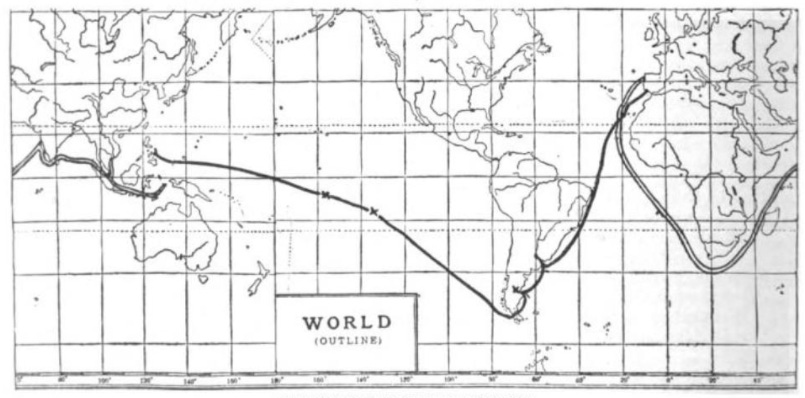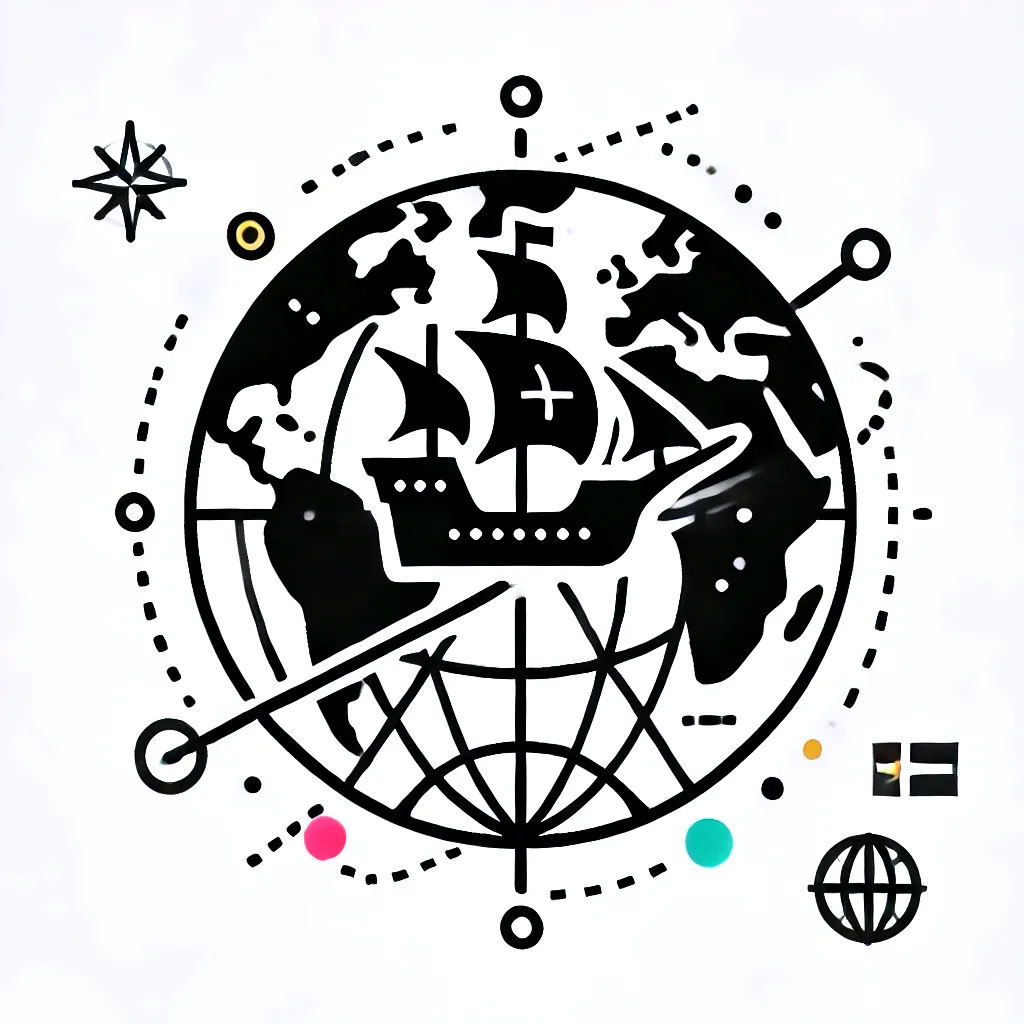What Global Shifts Matter to You? Why Discover the Unseen
It’s been 500 years since the first circumnavigation of Earth. Global shifts continue to shape the world and leadership.
It has been 500 years since Ferdinand Magellan’s circumnavigation of the globe. Magellan was a Portuguese explorer best known for the 1519–22 Spanish expedition to the East Indies, which achieved the first circumnavigation of Earth. At the time, it was a significant globally ambitious goal.
Ferdinand Magellan’s voyages: The double line represents Magellan's trip from Portugal to the Moluccas. The single line traces his long, continuous voyage from Spain to the Philippines.
Image Source: Wikipedia
The journey confirmed that the Earth was round. Earlier in history, humans believed the world was flat. This misconception shaped their worldview, commerce, and navigation. However as Magellan’s voyage revealed a new truth, it expanded possibilities for exploration, trade, and human progress. His journey proved the Earth’s roundness and opened up new opportunities for discovery. It transformed how we viewed the world and our place in it. It set the stage for other globally ambitious goals:
Ten years after Magellan’s voyage began in 1519, global exploration gained momentum, with more expeditions venturing into previously unknown territories.
Fifty years later, European powers had established new trade routes and colonies, significantly impacting global commerce and geopolitics.
A hundred years after Magellan’s journey, the world looked vastly different, with interconnected economies, expanding empires, and a deeper understanding of geography. This progress reshaped navigation and global relations, as nations now competed for influence and resources in a rapidly expanding world.
Throughout history, progress, both positive and negative, has followed major discoveries. Each time humanity expanded its view of the world, it enabled breakthroughs that were previously unimaginable. As business leaders, understanding how expanded context leads to deeper insight is strategic in navigating today’s complex and interconnected world.
How we see the world determines what we achieve in the world.
Significant historical shifts that reflect the importance of challenging existing beliefs and embracing new perspectives include:
The Heliocentric Theory
For centuries, people believed Earth was at the center of the universe. Copernicus, followed by Galileo, challenged this belief, shifting the focus to a heliocentric model. This change in perspective paved the way for advancements in astronomy, physics, and navigation. By accepting a broader view of the universe, humanity gained the ability to explore it more effectively, breaking away from the limitations of old beliefs.
Continental Drift
Discovered by Alfred Wegener, German climatologist and geologist, in the early 20th century expanded our understanding of the planet itself. While his theory was initially dismissed, later evidence of plate tectonics confirmed that the continents are constantly shifting. This revelation transformed how we understand natural disasters, resource distribution, and even human migration. By embracing a more global perspective of Earth’s geology, societies were better prepared to harness the planet’s resources and mitigate risks.
Structure of DNA
Breakthroughs in biology have occurred when scientists adopted a broader view. Gregor Mendel, Austrian biologist and meteorologist, is known as the ‘father of modern genetics. His work on genetics went unnoticed for decades, however after the structure of DNA was discovered in 1953, it reshaped the fields of medicine, agriculture, and more. This understanding transformed industries and continues to influence innovations today. This includes advances in gene editing technologies like CRISPR, personalized medicine, genetically modified crops, and biopharmaceuticals.
The m willingness to question established norms and explore broader contexts has been instrumental in every major discovery.
Seeing Beyond Our Lived Experience
The ability to see more has been critical across human history for identifying new opportunities and risks. Expanding our view beyond immediate surroundings can reveal insights that were previously hidden, helping to guide smarter decisions.
Stephen Covey, American author, said:
“We see the world, not as it is, but as we are - or, as we are conditioned to see it.”
In business, leaders benefit from questioning their own assumptions and biases. By looking beyond familiar environments, lived experience, and considering broader contexts - whether geographical, cultural, or technological - leaders can unlock new opportunities.
Studies on Human Shifts
Studies that explore the shift in human understanding and achievement, particularly in the context of technological advancements, globalization, and the changing landscape of leadership and knowledge acquisition. Here are a few key works that examine these shifts:
The Structure of Scientific Revolutions by Thomas Kuhn (1962)1: While written over 50 years ago, this influential work remains relevant today. Kuhn explores how scientific paradigms shift, leading to new ways of thinking and advancements in knowledge. He introduced the concept of “paradigm shifts,” which has become central to understanding changes in human achievement and innovation. Kuhn’s ideas about how progress is often non-linear, driven by breakthroughs that fundamentally change our understanding, apply beyond science to areas like technology and leadership.
The Great Convergence: Information Technology and the New Globalization by Richard Baldwin (2016)2: This book discusses how the rise of information technology has transformed globalization, creating a “global convergence” where ideas, services, and products move at unprecedented speeds. Baldwin highlights how the digital revolution has enabled new forms of human achievement, connecting people across the world and shifting the locus of power from traditional centers to new, digitally connected regions.
The Second Machine Age: Work, Progress, and Prosperity in a Time of Brilliant Technologies by Erik Brynjolfsson and Andrew McAfee (2014)3: This book explores the ongoing digital revolution, focusing on how advancements in AI, robotics, and automation are reshaping industries and human achievements. It presents a detailed analysis of how understanding and progress are shifting from manual labor and industrial innovation to digital and technological capabilities, enabling new types of achievement.
These works provide insight into how human understanding and achievement have evolved over time, often in response to shifts driven by technological, cultural, and societal changes.
What Shifts, Today?
Is this level of understanding required now? It may feel as though the most significant human achievements are behind us, or that the biggest challenges to address are within our organizations. Yet, various shifts are simultaneously taking place across the world today, with the potential to reshape the future:
Demographically, younger populations are rising in regions like Africa and Southeast Asia, while aging populations are reshaping economies in Europe, Japan, and elsewhere.
Geopolitically, rising nationalism, ongoing wars, and global realignments are altering trade dynamics and diplomatic relationships.
Economically, some regions face stagnation while others experience rapid growth, creating a divergence that business leaders must navigate. At the same time, the shift toward a regenerative economy is gaining momentum.
Corporately, industry landscapes are being reshaped, with winners like tech and e-commerce thriving, while traditional retail falters. Electric vehicles are rising, while fossil-fuel automakers face challenges. Streaming services are growing, while traditional media struggles.
Technologically, advances - particularly in AI, automation, and other exponential technologies - are transforming business models, workforce dynamics, and competitive advantage at unprecedented speeds.
Each of these shifts will have worldwide ripple effects, impacting countries, economies, and cultures. The combined impact of these shifts could amplify and accelerate one another, creating changes beyond what we can imagine today.
As leaders, seeing more of the world, beyond our lived experience and the status quo, and embracing a broader context, allows us to make more informed, strategic decisions as these shifts unfold.
Think and Act Global: Preparing for Global Shifts
Here’s how leaders can expanded their worldview to understand and prepare for global shifts taking place:
Expand Networks Globally: Build relationships that extend beyond your immediate company, city, or country. By engaging with diverse perspectives, you can uncover hidden opportunities and foster innovation.
Stay Informed on Global Shifts: Regularly monitor emerging global trends - whether demographic, technological, or geopolitical - to stay ahead of potential risks and seize emerging opportunities.
Partner Across Borders: Collaborate with organizations or individuals from different sectors or regions. These partnerships can drive new solutions to complex challenges and open up untapped markets.
Embrace Technological Innovation: Explore and experiment with AI, automation, and digital tools to streamline processes, increase efficiency, and expand a global presence with minimal reliance on physical touchpoints.
Engage in Strategic Foresight: Strengthen the ability to anticipate and navigate possible futures by exploring scenarios based on global trends - demographic, technological, geopolitical, and more. This can help to remove blindspots and biases and promote preparedness for a range of potential shifts.
The world is shifting and the future is being shaped today.
There’s more to the world than what we see.
Leaders that see more of the world - deliberately, discerningly - make better sense of it. They gain a strategic edge over leaders with a static worldview.
Are you seeing enough of the world to lead effectively here, there, everywhere?
What is the most important gap to fill before the start of 2025?
Further Reading:
https://press.uchicago.edu/ucp/books/book/chicago/S/bo13179781.html
https://www.hup.harvard.edu/books/9780674237841
https://psycnet.apa.org/record/2014-07087-000



